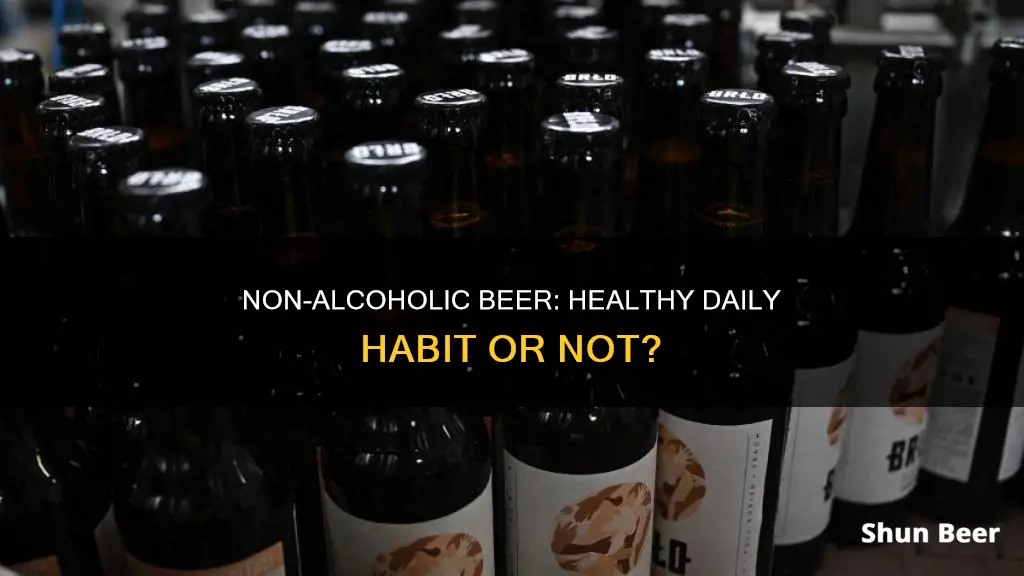
Non-alcoholic beer is often marketed as a safe alternative to alcoholic drinks, but it's important to understand the potential risks before consuming it. While non-alcoholic beer typically contains little to no alcohol, there may still be small amounts present. This can be especially harmful to specific groups, such as pregnant people and those with alcohol use problems, for whom non-alcoholic beer may pose risks and trigger cravings. Additionally, non-alcoholic beer is often high in calories and carbohydrates, which can lead to health issues such as obesity if consumed frequently. While it may be a good option for those looking to reduce their alcohol intake, it's crucial to be aware of these potential risks and consume it in moderation.
| Characteristics | Values |
|---|---|
| Alcohol content | Non-alcoholic beer is defined as having very little or no alcohol, with an alcohol content of less than 0.5% ABV in the US. |
| Taste | Non-alcoholic beer often smells and tastes similar to alcoholic beers. |
| Health | Non-alcoholic beer has fewer calories than regular beer. It may be a healthier alternative for people looking to reduce their alcohol intake, but it still contains calories and carbohydrates, which can lead to issues such as obesity and nausea if consumed in large quantities. |
| Safety | Non-alcoholic beer may not be safe for people with alcohol use disorder, as it can trigger cravings and lead to relapse. It is also not recommended for pregnant people due to the small amounts of alcohol it may contain. |
| Alternatives | Alternatives to non-alcoholic beer include kombucha, carbonated soda water with a splash of fruit juice, and non-alcoholic cocktails or "mocktails." |
What You'll Learn

Non-alcoholic beer and addiction recovery
Non-alcoholic beer is often marketed as a safe alternative to alcoholic drinks, and for many people, it is. However, for those recovering from alcohol addiction, it may be best to avoid non-alcoholic beer and opt for other drink choices.
The Risks of Non-Alcoholic Beer for Those in Recovery
The main risk of non-alcoholic beer for people in recovery from alcohol addiction is that it may trigger cravings and lead to a relapse. The smell, taste, and appearance of non-alcoholic beer are very similar to regular beer, and this can be a powerful trigger for those trying to maintain sobriety. Even the routine and context associated with drinking non-alcoholic beer can be enough to trigger cravings and lead to a relapse for some people in recovery.
Research supports this, with one study finding that the smell of beer may be enough to trigger cravings and a subsequent relapse among individuals with alcohol use disorder. In the study, rats were trained to self-administer alcohol when they smelled a particular scent, and the researchers found increases in dopamine—a brain chemical associated with feelings of elation and pleasure—in the rats' brains when they were exposed to the alcohol-related cue.
Additionally, non-alcoholic beers may still contain small amounts of alcohol. By law, non-alcoholic beers can contain up to 0.5% alcohol by volume (ABV), and some products may contain even more alcohol than their labels indicate. This means that consuming non-alcoholic beer could lead to a positive alcohol test, which may be problematic for those in recovery.
Alternatives to Non-Alcoholic Beer for Those in Recovery
For those in recovery from alcohol addiction, it is essential to be aware of triggers and avoid high-risk situations. Instead of non-alcoholic beer, some alternative drink options include:
- Seltzer water or other sparkling water
- Caffeinated beverages like soda or coffee
- Fresh-squeezed juice
- Mocktails
- Soda with fresh lime juice
- Soda with fresh fruit
The Bottom Line
While non-alcoholic beer can be a good alternative for some people looking to reduce their alcohol intake, it may not be the best choice for those in recovery from alcohol addiction. The potential risks of triggering cravings and leading to a relapse may outweigh the benefits of having a beer-like drink. Ultimately, the decision to drink non-alcoholic beer during recovery is a personal one and should be made in consultation with a healthcare provider, therapist, or addiction specialist.
Keto and Diet Root Beer: Is It Allowed?
You may want to see also

Non-alcoholic beer and pregnancy
Non-alcoholic beer is often marketed as a safe alternative for pregnant women, but it's important to be aware of the risks involved. While non-alcoholic beers typically contain less than 0.5% alcohol by volume (ABV), studies have shown that they can still have trace amounts of alcohol, and in some cases, higher levels than indicated on their labels. Given the risks associated with alcohol consumption during pregnancy, it is generally recommended to avoid non-alcoholic beer altogether.
Pregnancy is a crucial period for the developing baby, and consuming alcohol can pose serious risks. Alcohol can increase the chances of miscarriage, stillbirth, and premature birth. It is also linked to Fetal Alcohol Spectrum Disorders (FASD), which can cause physical, mental, and behavioral issues in children exposed to alcohol in the womb. FASD can lead to low birth weight, facial abnormalities, physical problems, and neurobehavioral disorders. Therefore, leading health organizations, such as the American College of Obstetricians and Gynecologists (ACOG) and the Centers for Disease Control and Prevention (CDC), advise pregnant women to abstain from alcohol completely.
The potential presence of alcohol in non-alcoholic beer raises concerns about its safety during pregnancy. While the exact effects of consuming these beverages during pregnancy are not well-studied, it is important to prioritize the health and well-being of the baby. Even trace amounts of alcohol can pose risks, and there is no known safe level of alcohol consumption during pregnancy. Therefore, it is generally recommended to choose alcohol-free mocktails or drinks labeled as "alcohol-free" instead of non-alcoholic beer. By law, these products must contain no detectable alcohol, ensuring a safer option for pregnant women.
The impact of alcohol on fetal development is a significant concern. Fetuses cannot metabolize alcohol efficiently, so any alcohol consumed by the mother can pass through the placenta and directly affect the baby. This can lead to fetal alcohol syndrome (FAS), which includes a range of developmental abnormalities. Babies with FAS may experience low birth weight, vision and hearing issues, developmental delays, learning and behavioral difficulties, and an increased vulnerability to substance abuse disorders.
While non-alcoholic beer may seem like a tempting alternative for pregnant women who want to enjoy the taste of beer, it is essential to prioritize the health of the baby. The potential risks associated with even trace amounts of alcohol make it advisable to abstain from non-alcoholic beer during pregnancy. Exploring alternative beverage options, such as alcohol-free mocktails, herbal teas, infused water, and fruit juices, can provide a flavorful and satisfying experience without the risks associated with alcohol.
Additionally, drinking beer during pregnancy can have implications for the health of the expectant mother. Research suggests a link between alcohol consumption and high blood pressure during pregnancy, which can increase the risk of developing chronic high blood pressure later in life. Pregnancy-related high blood pressure disorders can also lead to long-term and life-threatening complications for both the baby and the parent.
In conclusion, while non-alcoholic beer may seem like a safe alternative, it is best to avoid it during pregnancy. The potential risks associated with trace amounts of alcohol make it crucial to prioritize the health and development of the baby. Pregnant women can explore alternative beverage options and seek support from healthcare professionals and communities to navigate this special time.
Beer Drinking in Ads: Legal or Not?
You may want to see also

Calories and health
While non-alcoholic beer is not equivalent to a health drink, it is still a healthier choice than regular beer. This is because non-alcoholic beer contains fewer calories and less alcohol than regular beer.
Calories
Non-alcoholic beer is not calorie-free. The caloric content of non-alcoholic beers ranges from about 60 to 120 calories, with some as low as 17 calories and others as high as 98 calories. In comparison, regular beers typically contain anywhere from 145 to 175 calories, with some craft brews topping 200 calories. Light beers contain 95-120 calories.
Carbohydrates and Sugar
Non-alcoholic beers tend to have more carbohydrates than regular beers. This is because non-alcoholic beer packs more than twice the carbs as regular beer, mostly in the form of sugar, which is added to improve the taste once the alcohol has been removed. The sugar content of non-alcoholic beers can be as low as 0 grams and as high as 8 grams.
Alcohol Content
Non-alcoholic beer is not entirely alcohol-free. By law, non-alcoholic beers sold in the United States can contain up to 0.5% alcohol by volume (ABV). However, many brands claim to offer 0.0% ABV. Research suggests that many non-alcoholic beers contain more alcohol than their labels indicate. One study found that 30% of the non-alcoholic beers tested had more alcohol by volume than was indicated on their label, and six of the beers tested contained up to 1.8% ABV.
Health Benefits
Non-alcoholic beer can offer potential health benefits when consumed in moderation. It contains a variety of vitamins, minerals, and antioxidants that can contribute to overall health. For example, non-alcoholic beer can help reduce the risk of heart disease, aid in bone growth, and improve sleep quality. Non-alcoholic beer is also a good alternative to sugary drinks and alcoholic beverages, which can have negative impacts on health when consumed in excess.
Health Risks
While non-alcoholic beer is generally considered safe to drink, there are some potential health risks to consider. Firstly, most non-alcoholic beers still contain low levels of alcohol, which can be a concern for those who are sensitive to alcohol or recovering from alcohol addiction. The smell of non-alcoholic beer may also serve as a relapse trigger for those with alcohol use disorder. Secondly, non-alcoholic beer contains high levels of carbohydrates and sugar, which could contribute to weight gain and other health issues. Finally, non-alcoholic beer should be avoided during pregnancy, as it may contain small amounts of alcohol that could pose risks to the unborn baby.
Beer and the Feast of Unleavened Bread: What's Allowed?
You may want to see also

Non-alcoholic beer and driving
While non-alcoholic beer typically contains little to no alcohol, it is important to note that drinking it while driving can still lead to legal consequences in certain situations. Here is what you need to know about non-alcoholic beer and driving:
Open Container Laws
Open container laws in the US prohibit the consumption of alcoholic beverages in public places, including inside a vehicle. These laws are intended to reduce public intoxication and discourage individuals from driving under the influence. While non-alcoholic beer is not an alcoholic beverage, it is often packaged in containers that resemble standard beer bottles or cans. As a result, drinking non-alcoholic beer while driving can attract the attention of law enforcement officers, who may suspect you of consuming alcohol. In most US states, there is no distinction between "alcoholic" and "non-alcoholic" drinks, so you are likely to be pulled over if an officer sees you drinking from a bottle that looks like a regular alcoholic drink.
Blood Alcohol Concentration (BAC)
Non-alcoholic beer typically contains less than 0.5% alcohol by volume (ABV), which is significantly lower than the ABV of regular beer, typically around 5%. While the alcohol content in non-alcoholic beer is low, consuming large quantities can still lead to a detectable BAC level. It is important to note that the legal BAC limit for drivers is usually very low, and even small amounts of alcohol can cause a driver to exceed this limit. Therefore, if you plan to drive, it is advisable to avoid consuming non-alcoholic beer or any other beverage that contains alcohol.
Driving Under the Influence (DUI)
In the US, you can be charged with a DUI if a police officer believes you are intoxicated, regardless of whether you were drinking alcoholic or non-alcoholic beer. While non-alcoholic beer is unlikely to cause intoxication, consuming large quantities may still impact your driving ability and increase the risk of a DUI charge. It is important to note that the legal consequences of a DUI can be severe, including fines, license suspension, or even jail time.
In summary, while non-alcoholic beer is generally considered safe to consume while driving, it is important to be mindful of the potential legal implications. To avoid any issues, it is advisable to refrain from consuming any beverages that contain alcohol if you plan to drive.
Santa's Favorite Beverage: Beer or Not?
You may want to see also

Non-alcoholic beer alternatives
While non-alcoholic beers are marketed as a healthier alternative to regular beers, they may still contain small amounts of alcohol. As such, they may not be suitable for everyone, including those who are pregnant or trying to conceive, and those with a history of alcohol misuse.
If you are looking for non-alcoholic beer alternatives, here are some options:
- Soda with fresh lime juice
- Soda with fresh fruit
- Sparkling water
- Hopped seltzer, such as Hoplark 0.0 Really Really Hoppy, which mimics the profile of a traditional West Coast IPA
- Hopped tea and water, such as those produced by Hoplark, which allow you to taste the hops differently
- Kombucha, such as GT'S Synergy Trilogy Kombucha Drink Organic & Raw, KÖE Organic Kombucha Cans, or Health-Ade Pomegranate Kombucha
- Ginger beer, such as Betty Buzz Ginger Beer or Fever-Tree Ginger Beer
- Other non-alcoholic brews, such as Brooklyn Special Effects Non-Alcoholic Brew, which has citrus-forward flavours, or Athletic Brewing Company Athletic Lite, which is low-calorie, vegan and non-GMO
Ozark Beer Choices: What the Characters Drink
You may want to see also
Frequently asked questions
Non-alcoholic beer typically contains very little or no alcohol, and is usually produced by removing alcohol from regular beer. While it is unlikely that someone with a healthy functioning liver could get intoxicated from drinking non-alcoholic beer, there are still some health risks associated with drinking it every day. Non-alcoholic beer is often high in calories and carbohydrates, which can lead to issues such as obesity and nausea. It may also be problematic for people recovering from alcohol use disorder, as the taste and smell of beer can trigger cravings and lead to relapse.
Non-alcoholic beer can be a good alternative for people who are trying to reduce their alcohol intake, as it removes a toxic compound that increases the risk of chronic disease. It also tends to be lower in calories than regular beer. Some studies have also suggested that non-alcoholic beer may have additional health benefits, such as reducing inflammation and improving cardiovascular health.
In addition to the high calorie and carbohydrate content, non-alcoholic beer may still contain small amounts of alcohol. This can be a concern for pregnant people or those with liver impairments, as even small amounts of alcohol can be harmful. The taste and smell of non-alcoholic beer can also trigger cravings and lead to relapse for people recovering from alcohol use disorder.







